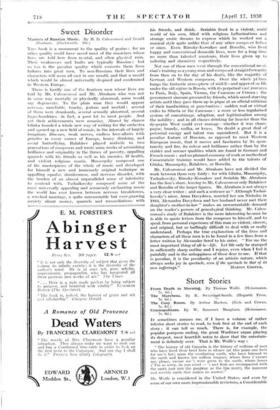Sweet Disorder
Tins book is a monument to the quality of genius : for no other quality could have saved most of the musicians whose lives arc told here from mantal, and often physical ruin. Their weaknesses and faults are typically Russian : but so too is the peculiar quality which converts them from failures into great men. To non-Russians their lives and characters will seem all cast in one mould, and that a mould which would be almost universally despised and condemned in Western Europe.
There is hardly one of the fourteen men whose lives are told by Mr. Calvocoressi and Mr. Abraham who was not in some way mentally or physically abnormal, some would say degenerate. To the plain man they would appear nervous, unreliable, touchy, jealous and morbid : several of them were drunkards, several sexually abnormal, several hypoAtondriacs—in fact, a poor lot to most people. And yet their achievements were amazing. Almost by chance Glinka founded a whole new way of writing for the orchestra and opened up a new field of music, in the intervals of largely imaginary illnesses, weak nerves, endless love-affairs with griseiles in every corner of Europe, heavy drinking, and social butterflying. Balakirev played midwife to two generations of composers and wrote some works of astonishing brilliance and originality in the throes of poverty, appalling quarrels with his friends as well as his enemies, ill health, and violent religious mania. Mussorgsky composed one of the masterpieces of' the whole of music and developed for himself a new and immensely original technique in appalling squalor, drunkenness, and nervous disorder, with the burden of an almost unparalleled sense of inferiority to contend with. Tschaikovsky composed some of the most universally appealing and sensuously enchanting music the world has ever known between nervous breakdowns, a wrecked marriage, a quite unreasonable but ever-gnawing anxiety about money, quarrels and reconciliations with his friends, and drink. - Seriabin lived in a violent3 mete world of his own, filled with religious hallucinations and strange erotic dreams to express which he worked out a musical style quite unlike that of any other composer befo:e or since. Even Rimsky-Korsakov and Borodin, who lived happy and conventional domestic lives, were for a long- time no more than talented amateurs, their lives given up to sailoring and chemistry respectively.
Not one of these men went through the conventional musi- cian's training as a young man and composed straightforwardly from then on to the day of his death, like the majority of German and Western composers. Over the who'.e pi2ture hangs the fantastic atmosphere of middle- and upper-elms life under the old regime in Russia, with its perpetual vast jouraeys to Paris, Italy, Spain, Vienna, the Caucasus or Crimea : the government sinecure procured by friends, which saved starving artists until they gave them up in pique at an official criticism of their handwriting or punctuation : sudden real or virtual exiles to Siberia or the Caucasus : a more or less regularised system of concubinage, adOption, and legitimisation among the nobility : and in all classes drinking far heavier than the dyspeptic West could ever manage—whether it was cham- pagne, brandy, vodka, or kvass. No doubt a great deal of potential energy and talent was squandered. But it is a peculiar feature of Russian, as opposed to most Western European music, that it moves and fascinates by its spon- taneity and fire, its colour and brilliance rather than by the stabler and serener qualities which are found in German and French music : and no planned economy of work or methodical Conservatoire training would have added to the talents of Glinka, Mussorgsky, Balakirev, or Borodin.
Mr. Calvocoressi and Mr. Abraham have not divided the work between them very fairly : for with Glinka, Mussorgsky, Tschaikovsky, Rimsky-Korsakov and Scriabin Mr. Abraham has the lion's share, leaving to Mr. Calvocoressi only Balakirev and Borodin of the larger figures. Mr. Abraham is not always a very clear writer : and such a sentence as " Although Tschai- kovsky's niece, Anna Davydova, married her son Nicholas in 1884, Alexandra Davydova and her husband never met their daughter's mother-in-law " makes an unwarrantable demand on the reader's powers of genealogical thinking. Mr. Calvo- coressi's study of Balakirev is the more interesting bemuse he is able to quote letters from the composer to himself, and to speak from personal experience of this man so violent, sincere, and original, but so bafflingly difficult to deal with or really understand. Perhaps the true eXplanation of the lives and characters of all these men is to be found in a few lines from a letter written by Alexander Serof to his sister. " For me the most important thing of all is—life. Let life only be stamped in sufficiently sharp outline and I rejoice, even when I feel it painfully and in the unhappiness of those dear to me. If that is peculiar, it is the peculiarity of an artistic nature, which always seeks joy in spectacle, even if the spectacle be that of its












































 Previous page
Previous page